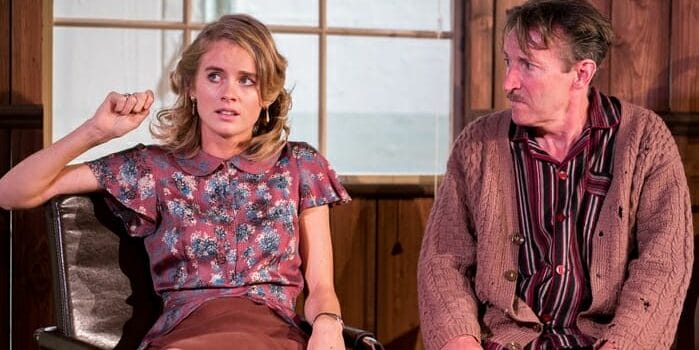
Written by Tony Cox and directed by Jimmy Walters, Mrs Orwell at The Old Red Lion Theatre, is the story of the final months of one of the world’s best-known writers. Based in fact, it has the opportunity to provide an interesting insight to a household name.
Renowned author George Orwell is seriously ill and close to death at just 46 years old, he is suffering from tuberculosis and is being looked after by a specialist at a private hospital. Desperately lonely, and believing it will cure his illness, he proposes to magazine editor Sonia Brownell, she agrees to marry him and although she has feelings for him, it isn’t love.
The blurb tells us that she must choose between Orwell and the man she actually loves, Maurice, however the script doesn’t really portray this effectively. Sonia makes the decision relatively quickly and Maurice is barely spoken of again. We don’t see any kind of conflict or decision-making process, even though there would have been plenty of time to explore this. The first act is quite light, content wise, and focusses rather heavily on the affliction, to the point where the coughing and hacking becomes a tad stomach churning.
Peter Hamilton Dyer gives a strong performance as Orwell, ravaged with illness he looks and behaves much older than his forty-six years. Dyer does a good job of highlighting Orwell’s idiosyncrasies; speaking in clipped tones and caring more about money than almost anything else. Cressida Bonas, as Sonia, confidently captures the turmoil faced by the character and does a good job with the rather shallow set of lines she has been given.
The remaining roles come across underdeveloped. The Nurse feels entirely perfunctory, although Rosie Ede does bring some life to it with subtle movements and disapproving looks. Robert Stocks plays Fred Warburg, a character whose sole function seems to be to fill in the background story; while this is welcome, a last-minute rant seems completely out of place. Edmund Digby Jones strikes a dashing figure as Lucian Freud, with a couple of good scenes, but it’s a real struggle to understand how the character fits in to the plot.
The set is remarkable and it’s amazing to see such considered staging in a relatively small space. Paul Wallis manages to recreate a 1940’s hospital room complete with corridor, which allows for hushed conversations, without it feeling cramped or confined.
Mrs Orwell tells an interesting story, but doesn’t quite manage to seal the deal. It ticks along at a meandering pace while the audience are left wanting for details, emotion and closure. Good staging and some strong performances paper over some of the cracks that appear in the script.

























